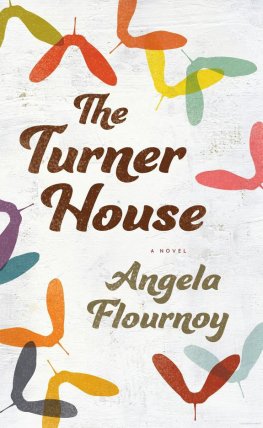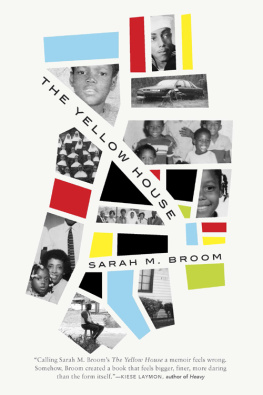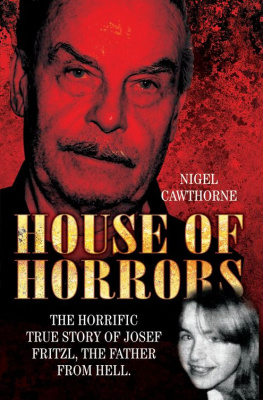Angela Flournoy
The Turner House
For my parents,
Francine Dunbar Harper
and Marvin Bernard Flournoy,
for being real
In loving memory of Ella Mae Flournoy,
who saw more than I can make up
and loved more than I can imagine

The Negro offers a feather-bed resistance. That is, we let the probe enter, but it never comes out. It gets smothered under a lot of laughter and pleasantries.
Zora Neale Hurston, Mules and Men
Out of the gray hills
Of industrial barns, out of rain, out of bus ride,
West Virginia to Kiss My Ass, out of buried aunties,
Mothers hardening like pounded stumps, out of stumps,
Out of the bones need to sharpen and the muscles to stretch,
They Lion grow.
Philip Levine, They Feed They Lion
The eldest six of Francis and Viola Turners thirteen children claimed that the big room of the house on Yarrow Street was haunted for at least one night. A ghosta haint, if you willtried to pull Cha-Cha out of the big rooms second-story window.
The big room was not, in actuality, very big. Could hardly be considered a room. For some other family it might have made a decent storage closet, or a mothers cramped sewing room. For the Turners it became the only single-occupancy bedroom in their overcrowded house. A rare and coveted space.
In the summer of 1958, Cha-Cha, the eldest child at fourteen years, was in the throes of a gangly-legged, croaky-voiced adolescence. Smelling himself, Viola called it. Tired of sharing a bed with younger brothers who peed and kicked and drooled and blanket-hogged, Cha-Cha woke up one evening, untangled himself from his brothers errant limbs, and stumbled into the whatnot closet across the hall. He slept on the floor, curled up with his back against dusty boxes, and started a tradition. From then on, when one Turner child got grown and gone, as Francis described it, the next eldest child crossed the threshold into the big room.
The haunting, according to the older children, occurred during the very same summer that the big room became a bedroom. Lonnie, the youngest child then, was the first to witness the haints attack. Hed just begun visiting the bathroom alone and was headed there when he had the opportunity to save his brothers life.
Three-year-olds are of a tenuous reliability, but to this day Lonnie recalls the form of a pale-hued young man lifting Cha-Cha by his pajama collar out of the bed and toward the narrow window. Back then a majority of the homeowners in that part of Detroits east side were still white, and the street had no empty lots.
Cha-Chas sneakin out! Cha-Chas sneakin out with a white boy! Lonnie sang. He stamped his little feet on the floorboards.
Soon Quincy and Russell spilled into the hallway. They saw Cha-Cha, all elbows and fists, swinging at the haint. It had let go of Cha-Chas collar and was now on the defensive. Quincy would later insist that the haint emitted a blue, electric-looking light, and each time Cha-Chas fists connected with its body the entire thing flickered like a faulty lamp.
Seven-year-old Russell fainted. Little Lonnie stood transfixed, a pool of urine at his feet, his eyes open wide. Quincy banged on his parents locked bedroom door. Viola and Francis Turner were not in the habit of waking up to tend to ordinary child nightmares or bed-wetting kerfuffles.
Francey, the eldest girl at twelve, burst into the crowded hallway just as Cha-Cha was giving the haint his worst. She would later say the haints skin had a jellyfish-like translucency, and the pupils of its eyes were huge, dark disks.
Let him go, and run, Cha-Cha! Francey said.
He aint runnin me outta here, Cha-Cha yelled back.
With the exception of Lonnie, who had been crying, the four Turner children in the hallway fell silent. Theyd heard plenty of tales of mischievous haints from their cousins Down Souththey pushed people into wells, made hanged men dance in midairso it did not follow that a spirit from the other side would have to spend several minutes fighting off a territorial fourteen-year-old.
Francey possessed an aptitude for levelheadedness in the face of crisis. She decided shed seen enough of this paranormal beat-down. She marched into Cha-Chas room, grabbed her brother by his stretched-out collar, and dragged him into the hall. She slammed the big-room door behind them and pulled Cha-Cha to the floor. They landed in Lonnies piss.
That haint tried to run me outta the room, Cha-Cha said. He wore the indignant lookeyebrows raised, lips partedof someone who has suffered an unbearable affront.
There aint no haints in Detroit, Francis Turner said. His children jerked at the sound of his voice. That was how he existed in their lives: suddenly there, on his own time, his quiet authority augmenting the air in a room. He stepped over their skinny brown legs and opened the big rooms door.
Francis Turner called Cha-Cha into the room.
The window was open, and the beige sheets from Cha-Chas bed hung over the sill.
Look under the bed.
Cha-Cha looked.
Behind the dresser.
Nothing there.
Put them sheets back where they belong.
Cha-Cha obliged. He felt his fathers eyes on him as he worked. When he finished, he sat down on the bed, unprompted, and rubbed his neck. Francis Turner sat next to him.
Aint no haints in Detroit, son. He did not look at Cha-Cha.
It tried to run me outta the room.
I dont know what all happened, but it wasnt that.
Cha-Cha opened his mouth, then closed it.
If you aint grown enough to sleep by yourself, I suggest you move on back across the hall.
Francis Turner stood up to go, faced his son. He reached for Cha-Chas collar, pulled it open, and put his index finger to the line of irritated skin below the Adams apple. For a moment Cha-Cha saw the specter of true panic in his fathers eyes, then Franciss face settled into an ambivalent frown.
Thatll be gone in a day or two, he said.
In the hallway the other children stood lined up against the wall. Marlene, child number five and a bit sickly, had finally come out of the girls room.
Francey and Quincy, clean up Lonnies mess, and all yall best go to sleep. I dont wanna hear nobody talkin bout they tired come morning.
Francis Turner closed his bedroom door.
The mess was cleaned up, but no one, not even little Lonnie, slept in the right bed that night. How could they, with the window curtains puffing out and sucking in like gauzy lungs in the breeze? The children crowded into Cha-Chas rooma privileged first visit for most of themand retold versions of the nights events. There were many disagreements about the haints appearance, and whether it had said anything during the tussle with Cha-Cha. Quincy claimed the thing had winked at him as he stood in the hallway, which meant that the big room should be his. Francey said that haints didnt have eyelids, so it couldnt have winked at all. Marlene insisted that shed been in the hall with the rest of them throughout the ordeal, but everyone teased her for showing up late for the show.
In the end the only thing agreed upon was that the haint was real, and that living with it was the price one had to pay for having the big room. Everyone, Cha-Cha included, thought the worry was worth it.
Like hand-me-down clothes, the legacy of the haint faded as the years went by. For a few years the haints appearance and Cha-Chas triumph over it remained an indisputable, evergreen truth. It didnt matter that no subsequent resident of the big room had a night to rival Cha-Chas. None of them ever admitted to hearing so much as a tap on the window during their times there. The original event was so remarkable that it did not require repetition. Cha-Cha took on an elevated status among the first six children; he had landed a punch on a haint and was somehow still breathing. But with each additional child who came along the story lost some of its luster. By the time it reached Lelah, the thirteenth and final Turner child, Francis Turners five-word rebuttal, Aint no haints in Detroit, was more famous within the family than the story behind it. It first gained a place in the Turner lexicon as a way to refute a claim, especially one that very well might be truea signal of the speakers refusal to discuss the matter further. The first six, confident that Francis Turner secretly believed in the haints existence, popularized this usage. By Lelahs youth, the phrase had mutated into an accusation of leg pulling:












